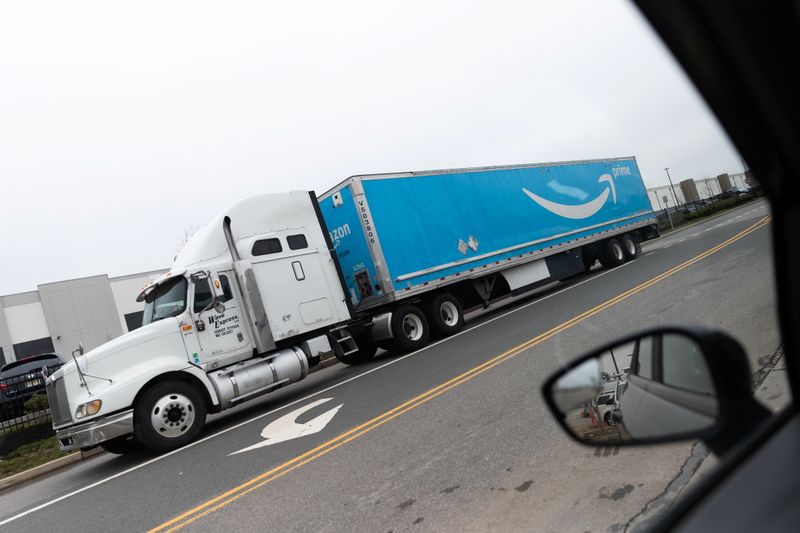By Laura Sanicola
(Reuters) - Amazon.com Inc (NASDAQ:AMZN) has ordered hundreds of trucks that run on compressed natural gas as it tests ways to shift its U.S. fleet away from heavier polluting trucks, the company told Reuters on Friday.
The coronavirus pandemic caused delivery activity to surge in 2020, with truck volumes exceeding 2019 levels on average while passenger car traffic fell. But that increase in road activity means more pollution, as heavier-duty trucks emit higher levels of greenhouse gases than passenger vehicles.
Transportation companies are building their stable of electric vehicles to reduce carbon emissions. Much of the nation's freight is delivered via medium- and heavy-duty trucks, which account for more than 20% of the industry's greenhouse gas emissions even though they make up less than 5% of the road fleet, according to U.S. federal data.
"Amazon is excited about introducing new sustainable solutions for freight transportation and is working on testing a number of new vehicle types including electric, CNG and others," the company said in a statement.
Amazon has ordered more than 700 compressed natural gas class 6 and class 8 trucks so far, according to the company.
The online retailer's sales rose 38% in 2020; it plans to run a carbon neutral business by 2040.
The engines, supplied by a joint venture between Cummins Inc (NYSE:CMI) and Vancouver-based Westport Fuel Systems (NASDAQ:WPRT) Inc, are to be used for Amazon's heavy duty trucks that run from warehouses to distribution centers. More than 1,000 engines that can operate on both renewable and non-renewable natural gas have been ordered by the supplier, according to a source familiar with the situation.
Natural gas emits approximately 27% less carbon dioxide when burned compared with diesel fuel, according to the U.S. Energy Information Administration.
Electric-powered motors are considered less viable for heavy-duty trucks than for the average passenger vehicle.
In 2019, Amazon ordered 100,000 electric vans from startup Rivian Automotive LLC. The first of those vans, to be used for last-mile delivery to customers, are to be delivered this year. The company also ordered 1,800 electric vans from Mercedes-Benz for its European delivery fleet.
Other transportation companies are also experimenting with ways to reduce emissions.
In 2019, United Parcel Service Inc (NYSE:UPS) announced plans to buy more than 6,000 natural gas-powered trucks over three years and step up purchases of renewable natural gas (RNG) as part of a $450 million investment to reduce the environmental impact of its 123,000-vehicle fleet.
RNG and natural gas from fossil fuel are both methane gases and can be used interchangeably. RNG is derived from decomposing organic matter such as cow manure on dairy farms, discarded food in landfills and human waste in water treatment plants. It also prevents naturally occurring methane - a powerful greenhouse gas - from being released into the environment.
Amazon shares were down 0.1% in post-close trading. Shares of Cummins rose 4%, while the U.S.-listed shares of Canada-based Westport surged, gaining 47% in the aftermarket session.
